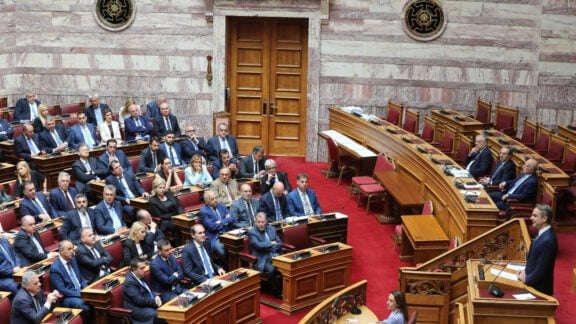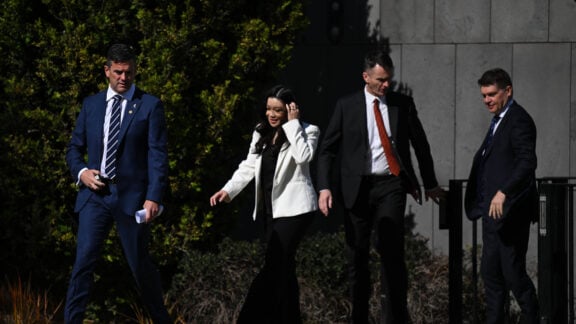The prime minister sat at his desk, rubbing his temples. He had a throbbing headache. It was just after 11pm. He willed himself to pick up the following briefing on his desk.
‘Good evening, prime minister’, interjected a soft but deep voice.
The prime minister was startled. He surveyed his office – it was empty.
‘I understand that it has been a difficult week for you,’ said the voice. ‘Scandals like this test a politician’s resolve and dexterity.’
Boris Johnson jumped from his chair, looking wildly around his office. ‘Who goes there?’ he demanded, in as firm a voice as he could muster.
‘Down here, prime minister. My sincere apologies; I did not mean to startle.’
Johnson looked down. The bust of the ancient Athenian statesman, Pericles, sitting on his desk, was apparently talking to him.
He rubbed his eyes and glanced again at the bust.
‘I was looking for an opportune moment to chat with you. I appreciate that the timing is less than ideal, but I hope you will indulge me briefly.’
The bust’s lips were moving, and it was talking to the prime minister. Its face, with its resplendent beard, was animated.
‘I must be dreaming’, muttered a distressed Johnson.
‘I assure you, Prime Minister, that you are not dreaming. You may like to pour yourself a stiff drink; it ought to help with the nerves’, said Pericles, nodding towards the prime minister’s drinks cabinet.
Johnson slowly stood, walked to the cabinet, and poured himself a whisky. He gulped it down, poured another, and tentatively sat at his desk. He closed his eyes, hoping with all his might that the absurd hallucination would soon pass.
‘I have sat on your desk for the entirety of your prime ministership’, continued the bust.
‘I assume you placed me here for a reason — perhaps my political legacy inspires you. If that is the case, I am humbled.’
Prime Minister Johnson had long hailed Pericles as one of his political idols. He had lauded Pericles’ leadership of Athens during its Golden Age. Pericles promoted the arts and literature and helped cultivate Athens into the educational and cultural centre of the ancient Greek world.
‘I have watched you deliberate over your country’s domestic and foreign policy and navigate internal party politics. How you handle this present scandal remains to be seen.
‘As you know, it was a plague that caused my demise. However, I digress.’
The prime minister continued to stare dumbfounded at the talking bust.
‘Prime Minister, there is a particular topic I wish to discuss with you: the Parthenon Marbles held by the British Museum.
‘As a young man, I know you supported the repatriation of the Marbles to their homeland. I now implore you to see reason and adopt that position again.’
Mesmerised, Johnson did not take his eyes off the talking bust. He listened, jaw slack and mouth gaping. True, Johnson had once advocated for the Marbles’ return to Greece.
While a student at Oxford, he had written an article for a magazine published by the Oxford Union Society passionately contending for the Marbles’ “immediate” repatriation. He had denounced the British government’s policy as “unacceptable to cultured people,” admonishing the “scandalous” way it handled the issue.
‘It feels like yesterday that I convinced the Athenian Assembly to commission the Acropolis’ rebuilding’, Pericles continued.
‘The Parthenon was always intended to be the crowning jewel, serving as a war memorial and new temple to the goddess Athena.
‘I can still visualise the marble statues of the pediment and the frieze. Absolutely sublime. Poetry in motion.
‘Little could I have expected then that it would capture civilisation’s collective imagination for all eternity.
‘Prime minister, much has been written about the unlawful circumstances under which Thomas Bruce, the seventh Earl of Elgin, desecrated the Parthenon. Nevertheless, let me remind you that from 1801 until 1803 while serving as the British ambassador to Constantinople, Lord Elgin directed his workmen to saw off fifty-six of the ninety-seven surviving panels on the Parthenon’s frieze, carry off the fifteen best-preserved metopes, and despoil the pediment figures.
‘Then, of course, in 1816, Elgin sold the marbles to the British government, which purportedly entrusted them — by Act of Parliament — to the trustees of the British Museum.
Surprising himself, the prime minister interjected as if by reflex.
‘Yes… and so it is a matter for the Museum’s trustees as to whether the Marbles are returned to Greece or not.’
‘But, prime minister’, continued Pericles, ‘While the 1816 Act vested the Parthenon Marbles to the trustees of the British Museum, it is the British Museum Act 1963 which prevents their return under British law. Let me illustrate. If you could please look at your computer screen for a moment.’
Johnson looked across at his screen, blinking in disbelief. The bust had apparently assumed control of his computer, for the screen flashed twice before a new internet browser showed the relevant legislation.
‘Prime minister, the 1963 Act prohibits the British Museum’s trustees from disposing objects that have been vested in them as part of the museum’s collections, except in a small number of exceptional circumstances, including, for example, ‘if the object is a duplicate of another object’ (the page automatically scrolled down and highlighted section 5(1)(a)), or ‘in the opinion of the Trustees the object is unfit to be retained in the collections of the Museum and can be disposed of without detriment to the interests of students’ (section 5(1)(c) was now highlighted). Needless to say, there does not appear to be scope under the 1963 Act — in its current form — to pursue the return of the Marbles.’
Pericles, pausing to collect his thoughts, continued.
‘Successive British governments have, like yourself, rejected calls to negotiate on the Marbles, instead noting that this is squarely a matter for the British Museum’s trustees.
‘This overlooks the fact that Parliament would first need to amend the 1963 Act to either exclude the Marbles or give the trustees a general discretion to dispose of museum property.’
Again, by reflex, the prime minister interjected, ‘The Elgin Marbles are rightfully stored and displayed in the Duveen Gallery.
‘They are exquisitely cared for by the museum. Even if I supported their return to Greece, it’s not exactly an ideal time for me to worry about this issue.
‘There are, as I am sure you will appreciate, more pressing matters for me to deal with at present’, he said, exasperated.
‘But there will never be a perfect time’, pressed Pericles, ‘And there will always be excuses; for instance, the prevailing dread about the precedent it might set. If you say yes to one request, you will suddenly find the British Museum empty.
‘I submit that a blanket response like this is unsatisfactory’, said Pericles.
‘The British government and British Museum’s views on the Marbles should not be based on the assumption that this is an ‘all or nothing’ proposition. Instead, a more nuanced and considered assessment of the return of cultural objects is required,’ said Pericles’ bust.
‘There ought to be a well-thought-out and articulated process for judiciously weighing up requests for repatriation.
‘In this respect, Geoffrey Robertson KC has done a remarkable job of outlining a possible international convention and tribunal to adjudicate and enforce the repatriation of cultural heritage objects and the factors that would weigh for and against repatriation.
‘Without such an international convention and tribunal at present, I would urge the British Museum — following the necessary amendments to the 1963 Act — to draw upon Robertson’s factors in assessing requests for repatriation.
‘For example, the following factors could support repatriation: where the objects are of high cultural significance, perhaps as certified by independent experts; where objects have been taken as a spoil of war or by any act of force, or by any unreasonable or illegal act; and if the institution to which it is proposed to be returned can securely preserve the objects.

‘In the case of the Marbles, there is no question that they represent the keys to ancient Athens’ glorious history. Further, there is no question about the wrongful circumstances in which they were taken. I would also remind you that the third floor of the Acropolis Museum was purpose-built to receive the Marbles when they return from London so that they can be displayed alongside those already held.
‘Rally the British Parliament, prime minister, to amend the legislation’, implored the ancient Athenian leader.
‘Then do what you must to convince the British Museum’s trustees to return the Marbles to Greece. Remind them that in the case of the Marbles, it is more than a struggle for repatriation — it is ultimately a struggle for reunification.
‘This would finally restore them to their innately true form: to quote Christopher Hitchens, “a stone poem carved as a unity that tells a single story”. Now, if you would once again, please look at your computer.’
The screen flashed twice. This time, a photo appeared of a dapper, 21-year-old Johnson, talking with Greece’s Minister of Culture at the time, the larger-than-life former actress Melina Mercouri.
Mercouri launched an international campaign for the Marbles’ return in 1983. UNESCO’s World Conference on Cultural Politics subsequently recommended that “Member States view the return of the Parthenon marbles as an instance of applying the principle that elements abstracted from national monuments should be returned to those monuments”.
‘Do you remember this meeting, Prime Minister? Following your polemic on the Marbles’ return, you invited Ms Mercouri to be the main speaker at an Oxford Union debate on 12 June 1986, entitled: “This house believes that the Elgin marbles must be returned to Athens.” Mercouri delivered an impassioned speech, with you in support that would see her win the vote.’
Johnson remembered it well and recalled how delighted he had been when Mercouri accepted his invite to be the main speaker at the debate and how she embodied, with irrepressible energy and passion, the national feeling of the Greek people regarding the issue.
‘If it is not you, prime minister, it must be your successor. The time is right for the long-sought reunification of the Marbles.
‘Britain would never perceive it as a concession or defeat, but rather a class act.’
‘I believe I have taken up enough of your time this evening. Thank you for listening. I wish you well for the weeks ahead. I trust that you will not forget our conversation tonight.’
With that, the bust of Pericles morphed back into its still and expressionless form, leaving the Prime Minister stunned in his chair.
James Tselios is a lawyer who has written for The Alternative Law Journal and Medium









